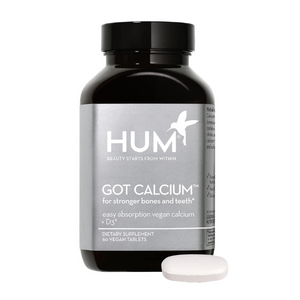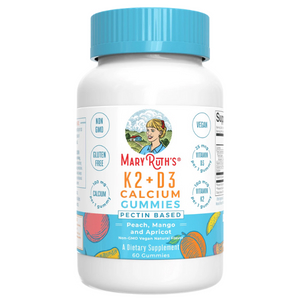5 Best Vegan Calcium Supplements 2024: Do They Actually Work?
All articles are produced independently. When you click our links for purchasing products, we earn an affiliate commission. Learn more about how we earn revenue by reading our advertise disclaimer.
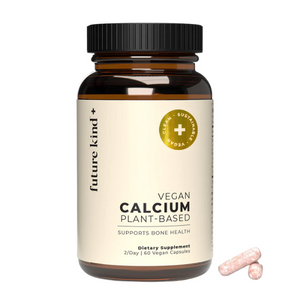
Future Kind+ Vegan Calcium
- Non-GMO, gluten-free
- Third-party tested
- No artificial colors or preservatives
- Sustainable initiatives and charity donations
10% Off Coupon: 10OFF
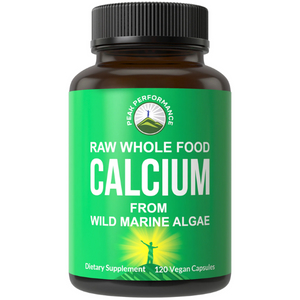
Peak Performance Raw Whole Food Calcium
- Third-party tested
- 100% money-back guarantee
- Non-GMO, gluten-free
- One-for-one donation to a child in need
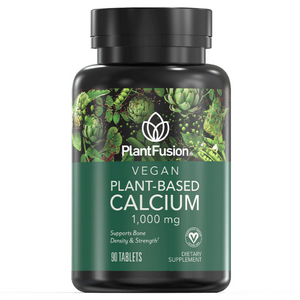
PlantFusion Vegan Plant-Based Calcium
- Non-GMO, gluten-free
- Kosher-friendly
- Easy-to-take tablets
- Third-party tested
25% Off Coupon: HEALTHCANAL
Calcium gets a lot of hype for bone health, and rightfully so. Your body requires calcium to build and maintain bone strength. But calcium also plays many other bodily roles, including heart health, muscle function, and nerve signaling. Many plant sources are rich in calcium, but studies tend to agree that vegans fall short of their needs. Enter vegan calcium supplements.
Most calcium supplements are not vegan-friendly, so finding one that fits your plant-based diet can be challenging. In this article, we’ll review five of the best vegan calcium supplements on the market today so you can confidently boost your calcium intake while staying true to your vegan diet.
5 Best Vegan Calcium Supplements On The Market In (April. 2024)
- Future Kind+ Vegan Calcium – Editor’s Choice
- Peak Performance Raw Whole Food Calcium – Best Calcium Supplement With A Whole Food Blend
- PlantFusion Vegan Plant-Based Calcium – Most Calcium Per Serving
- HUM Nutrition Got Calcium – Most Affordable Calcium Tablet
- MaryRuth’s K2 + D3 Calcium Gummies – Best Vegan Calcium Gummies
Should Vegans Take Calcium Supplements?
While it’s possible to meet most of your nutrition needs through plant-based foods alone, research indicates those following a vegan diet need to be intentional regarding some nutrients. For example, essential nutrients like vitamin B12, vitamin D, and iron are commonly found in animal sources, so vegans may need to consider supplements to meet their daily needs. The same applies to calcium. Research has shown that those following a vegan or vegetarian diet are more likely to experience low bone density[1], emphasizing the need for supplementation to prevent calcium deficiency and bone fractures.
5 Best Vegan Calcium Supplements Worth Buying In 2024
Future Kind+ Vegan Calcium
Each serving of the plant-based calcium supplement from Future Kind provides 500 milligrams (mg), sustainably sourced from red algae out of the waters of the North Atlantic.
- Made with ingredients free from genetically modified organisms (Non-GMO), gluten-free
- Third-party tested
- Sustainable initiatives and charity donations
- Does not contain vitamin D
Future Kind was founded by two Australian brothers, both vegan and certified nutritionists. Their education emphasized the health benefits a plant-based diet could offer, but they found it difficult to find trusted vegan vitamin supplements. So, in 2019, they launched Future Kind with the mission to provide evidence-based products that used 100% vegan ingredients and focused on environmental sustainability.
Future Kind’s beliefs are at the core of its products. They only use organic, vegan, and cruelty-free ingredients; their shipping is eco-friendly and carbon-neutral. In addition, they are B Corp Certified and have donated over $30,000 to vegan animal sanctuaries.
Their vegan calcium supplement is a prominent contender in the market today. Each serving provides 500 mg of calcium (in the form of calcium carbonate) sourced from red marine algae. This marine algae is a natural calcium carbonate and also a natural source of magnesium. Each serving of Future Kind’s calcium supplement provides 38 mg of magnesium and 72 trace minerals that enhance calcium absorption.
Future Kind’s products are third-party tested and free from gluten, wheat, nuts, soy, genetically modified organisms (non-GMO), and artificial colors and preservatives. Their algae-based calcium is no exception.
The manufacturer cautions that those under the age of 18 or who are pregnant should not take this supplement without consulting their physician first.
Peak Performance Raw Whole Food Calcium
Where most calcium supplements use synthetic formulas and fillers, Peak Performance Raw Whole Food Calcium uses a blend of 25 whole foods.
- Third-party tested
- 100% money-back guarantee
- Non-GMO, gluten-free
- One-for-one donation to a child in need
- Four capsules per serving
- Contains proprietary whole-food ingredients
Peak Performance was founded by Talor Zamir after struggles in their health journey. After endless nutrition research and seeing results first-hand, Zamir decided to share the knowledge, and Peak Performace was born.
Peak Performace is committed to using organic, whole foods to create high-quality products you can trust. They rely on third-party testing and test every batch to ensure product potency and quality.
Peak Performance Raw Whole Food Calcium provides 800 mg of calcium sourced from wild red marine algae. The algae-based calcium supplement contains a blend of 25 whole foods, providing a variety of nutrients and enzymes that support digestion and assimilation. Along with 800 mg of calcium, the supplement includes magnesium, vitamin K, vitamin D3, and vitamin C.
Along with creating quality products, Peak Performance’s mission includes helping children at risk for malnutrition through its one-for-one promise. Through a partnership with Vitamin Angels, Peak Performance can donate a year’s worth of vitamins to a child in need with every bottle purchased.
You can purchase one bottle at a time or take advantage of a multi-buy discount. And if you’re not 100% satisfied with the product, Peak Performance offers a 30-day money-back guarantee.
PlantFusion Vegan Plant-Based Calcium
Founded by two self-coined “foodies,” PlantFusion focuses on products that don’t have to sacrifice taste or nutrition to provide customers with quality.
- Non-GMO, gluten-free
- Kosher-friendly
- Third-party tested
- Certified by the National Sanitation Foundation (NSF)
- Most nutrients on the high end of Recommended Dietary Allowances (RDA)
- Need to take three tablets per serving
- Contains proprietary whole-food ingredients
PlantFusion started when co-founders Phil Vigeant and Greg Cooper searched for a protein shake that didn’t have allergens, empty fillers, and overly processed ingredients. They couldn’t find anything suitable, so they created nutrient-dense products, 100% plant-based, and allergen-free, all without sacrificing flavor.
Their vegan calcium is derived from the red algae sourced from the icy waters off the shores of Iceland. Each serving of the calcium supplement provides 1000 mg of calcium in addition to a helping of vitamin D3, vitamin K2, and 72 trace minerals, including magnesium, boron, and strontium.
These easy-to-take tablets are dairy and gluten-free, non-GMO, and kosher-friendly. You can swallow the tablets whole or crush them to add to your favorite smoothie, yogurt, or applesauce. Since each serving provides calcium on the upper end of the recommended dietary allowance (RDA), it’s helpful that you can split the tablet. Purchase as a one-time purchase or sign up for subscription delivery for additional savings.
HUM Nutrition Got Calcium
Every serving of HUM’s Got Calcium provides 630 mg of calcium along with 10 micrograms (mcg) of vitamin D3 for enhanced calcium absorption. HUM also provides free access to a registered dietitian for one-on-one expert advice.
- Non-GMO, gluten-free
- Triple tested for purity
- Affordability
- Some complaints about tablet size
What started as a personal journey to improve longtime skin struggles eventually developed into a company focusing on the connection between health and nutrition. Together, co-founders Walter and Chris joined forces with registered dietitians on a mission to help people feel good in their skin and bodies.
One serving of HUM’s Got Calcium supplement provides 630 mg in the form of calcium citrate and 10 mcg of vitamin D3 per day. Every ingredient is carefully tested to ensure HUM delivers the highest quality possible. HUM products undergo independent lab testing to assess their potency.
HUM’s Got Calcium supplement is non-GMO, gluten-free, and contains no artificial sweeteners or colors. According to the company’s website, take two tablets daily with or without food. Each serving costs less than a dollar, and you still have the chance for additional savings by buying multiple products at a time.
MaryRuth’s K2 + D3 Calcium Gummies
While the recommended serving only provides 100 mg of calcium per gummy, MaryRuth’s K2 + D3 Calcium Gummies are packed with flavor.
- Peach, mango, and apricot flavors
- Non-GMO, gluten-free
- Store credit guarantee
- Only 100 mg of calcium per serving
- Higher in calories than comparable supplements
- Contains one gram of cane sugar and tapioca syrup
MaryRuth’s, as a company, stemmed from Mary Ruth Ghiyam’s career as a certified health educator, nutrition consultant, and culinary chef. When her clients all seemed to have similar health goals, the idea for her supplement company took shape. MaryRuth’s now offers over 100 products to support people who want to embrace their health.
Each serving of MaryRuth’s K2 + D3 Calcium Gummies provides 100 mg of calcium in the form of tribasic calcium phosphate. However, it also provides 25 mcg of vitamin D3 and 100 mcg of vitamin K2. These gummies are made from non-GMO, vegan lichen, and natto, and the combined vitamins work together to optimize calcium absorption.
Each serving provides 10 calories and 10 mg of sodium. So, it’s important to note that MaryRuth’s calcium gummies provide only about 8% of the recommended %DV per serving. So, if your diet lacks sources of calcium, you may need to take multiple servings of these vegan gummies, which then also increases your calorie, sugar, and sodium intake. The World Health Organization is lowering its daily recommendations for cane sugar[2] intake to 25 grams per day or six teaspoons, which can add up quickly.
If you aren’t satisfied with your product, MaryRuth’s offers a 30-day guarantee. Simply contact their customer support team, and they will send you a different product or provide you with a store credit to choose your own.
What Are The Best Vegan Calcium Sources?
Many foods contain calcium, but when most of us think of calcium-rich foods, we immediately jump to dairy foods. But dairy can’t be everyone’s “go-to” calcium source. Those who follow a vegan diet must get their calcium from plant foods.
Here are some of the best vegan calcium sources:
Soy-Based Foods
Soybeans are naturally high in calcium, so foods such as tofu, tempeh, and natto can be excellent choices when boosting your calcium intake.
Leafy Greens
Dark leafy greens such as bok choy, kale, and spinach, as well as turnip, mustard, and collard greens, are rich in calcium. However, some greens (like spinach, beet greens, and Swiss chard) are also high in oxalic acid, which can work against calcium absorption. You can reduce the oxalate presence[3] in these foods by boiling them.
Fortified Foods And Drinks
Certain foods and drinks can have calcium added to them during the manufacturing process. For example, some of these fortified foods include cereals and baked goods like crackers, bread, and tortillas made with fortified flour.
Plant milk and orange juice are also commonly fortified with calcium and can add significant calcium to your diet.
Seeds
While their content can vary based on their variety, seeds and their butters can be excellent sources of calcium. For example, tahini (butter made from sesame seeds) contains 128 mg of calcium[4] in just two tablespoons. However, two tablespoons of dried sesame seeds only provide 88 mg of calcium[5].
Chia and flaxseeds can also provide a decent amount of calcium. Consider adding them to your favorite smoothie or baked goods.
Beans And Lentils
Winged beans, white beans, navy beans, and black beans are among the top sources of calcium in the beans family. Soaking, sprouting, and fermenting your beans can help promote absorption.
How To Take Vegan Calcium Supplements?
It’s best to follow the instructions listed on your supplement’s bottle unless otherwise directed by your doctor. However, your calcium supplement can affect your body’s absorption of other vitamins, so it’s wise to plan your supplement routine carefully according to your lifestyle factors.
First, consider the calcium form provided by your supplement. Calcium citrate can be taken either with or without food, but calcium carbonate should be taken with a meal. This is because the body’s stomach acid during digestion can support the absorption of calcium carbonate. Calcium citrate does not need stomach acid to be absorbed.
Next, calcium is best absorbed in smaller doses. So, if your calcium supplement is more than 600 mg, consider breaking it into two daily doses.
Lastly, calcium supplements can interact with specific nutrients and prescription medications. Take your multivitamin separately, as calcium can affect how your body absorbs iron, magnesium, and zinc. And discuss any potential medication interactions with your doctor before starting a new supplement.
What To Look For In A Vegan Calcium Supplement
Many vegans supplement calcium to prevent deficiency, but not all calcium supplements are created equal. When searching for a calcium supplement, there are a few factors to consider, especially in comparison to non-vegan calcium supplements.
One of the primary things to consider is the form of calcium your supplement provides, as the calcium form is usually a good indicator of absorption. Calcium carbonate and calcium citrate are most commonly used in supplements, but calcium lactate and calcium gluconate aren’t uncommon.
You also need to consider the amount of calcium provided with each serving. While it’s essential to provide your body with enough calcium to meet its demands, you want to avoid consuming too much calcium. Excess calcium in your body can weaken your bones, affect your heart and brain health, and create kidney stones. To give you an idea of your needs, the RDA for calcium[6] for men and women aged 19-50 is 1,000 mg daily.
Furthermore, your body absorbs calcium more efficiently in small doses. So look for serving sizes that are less than 600 mg each. If they provide more than 600 mg, ensure you can break up the serving over multiple doses.
Lastly, pay attention to the other vitamins and minerals included in the supplement. For example, vitamin D supports calcium absorption. If you don’t get enough vitamin D through your diet or time in the sun, you may benefit from a vegan calcium supplement with vitamin D included (ideally vitamin D3). Same for vitamin C and magnesium. Not all calcium supplements will have these, but they can be an added bonus in certain situations.
Final Thought
Meeting our calcium needs is critical for maintaining bone health, muscle function, nerve signaling, and heart health. While it’s possible to meet those demands through plant foods alone, studies suggest most vegans should rely on supplements to prevent calcium deficiency.
Where non-vegan supplements tend to include synthetic ingredients, most vegan brand supplements use whole food sources. When searching for the right plant-based calcium supplement for your routine, consider the calcium form provided, its serving size, and other vitamins included in the supplement.
Of course, we must remember that other nutrients and lifestyle factors can affect bone density and improve bone health. So, if you have questions about your needs, consider meeting with your doctor or registered dietitian to ensure you’re getting enough calcium.
Frequently Asked Questions
According to the National Institutes of Health Office of Dietary Supplements[6], the average adult between the ages of 19 and 50 needs 1,000 mg of calcium daily. The recommended dietary allowance (RDA) bumps to 1,200 mg daily for females over 50 years and males and females over 70 years.
Yes, vegan calcium supplements can benefit those who do not eat animal products. Since vegans tend to fall short of their daily calcium needs, vegans must consider supplementation to prevent calcium deficiency.
Vegan, calcium-rich foods include but are not limited to tofu, tempeh, dark leafy greens, and certain beans and lentils. Fortified foods and drinks, such as certain cereals and orange juice, can also be good sources of calcium.
Since magnesium works closely with calcium, it’s essential to maintain the appropriate ratio between the two nutrients. The optimal ratio is 2:1[7], calcium to magnesium. So if you take 1,000 mg of calcium each day, you would likely benefit from 500 mg of magnesium daily. Depending on your individual needs, you may also consider taking vitamin D3 and vitamin C to help absorption.
+ 7 sources
Health Canal avoids using tertiary references. We have strict sourcing guidelines and rely on peer-reviewed studies, academic researches from medical associations and institutions. To ensure the accuracy of articles in Health Canal, you can read more about the editorial process here
- Iguacel, I., Miguel-Berges, M.L., Gómez-Bruton, A., Moreno, L.A. and Julián, C. (2018). Veganism, vegetarianism, bone mineral density, and fracture risk: a systematic review and meta-analysis. Nutrition Reviews, [online] 77(1), pp.1–18. doi:10.1093/nutrit/nuy045.
- Food Pyramid. (2016). Daily Sugar Intake – How Many Grams of Sugar a Day? [online] Available at: http://www.foodpyramid.com/daily-sugar-intake/
- Chai, W. and Liebman, M. (2005). Effect of Different Cooking Methods on Vegetable Oxalate Content. Journal of Agricultural and Food Chemistry, [online] 53(8), pp.3027–3030. doi:10.1021/jf048128d.
- Usda.gov. (2022). FoodData Central. [online] Available at: https://fdc.nal.usda.gov/fdc-app.html#/food-details/170189/nutrients
- Usda.gov. (2022). FoodData Central. [online] Available at: https://fdc.nal.usda.gov/fdc-app.html#/food-details/170150/nutrients
- Nih.gov. (2012). Office of Dietary Supplements – Calcium. [online] Available at: https://ods.od.nih.gov/factsheets/Calcium-HealthProfessional/
- DeLuccia, R., Cheung, M., Ng, T., Ramadoss, R., Altasan, A. and Sukumar, D. (2019). Calcium to Magnesium Ratio Higher Than Optimal Across Age Groups (P10-100-19). Current Developments in Nutrition, [online] 3(Supplement_1). doi:10.1093/cdn/nzz034.p10-100-19.

